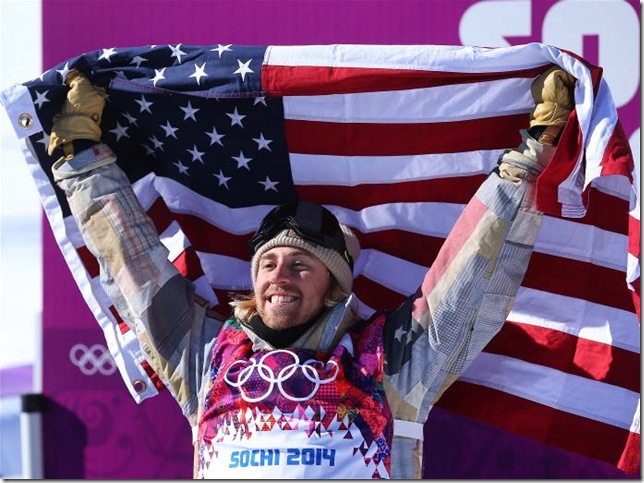By Myles Ludwig
When the ancient gods descended from Mt. Olympus, it’s not likely they figured their progeny would be luging down the slick course of Sanki Sliding Center at 85-plus mph.
Not likely Homer could evoke the heroism of snowboarders Sage Kotsenburg and Jamie Anderson, skater dudes on snow, leaping and twirling off the rails of Rosa Khutor, though there’s a bit of post-modern Ulysses and Penelope in them as they stride the newly minted street of Sochi, once home to the hapless Circassians pushed into the sea by the Russians.
I think homecoming queen Maria Sharapova could qualify as the Aphrodite of the Winter Olympics.
But, indeed, the Olympians of today, even if their sports lives depend on the corporate branding Titans, certainly capture our imagination. Their style, their grace, elegance is indisputable and they inspire us to imagine the best parts of ourselves, minus the universal remote control and the super-sized screen. Hidden from view are the endless hours of enduring do it again, get it right, pick yourself up after you crash, no crying on TV.
And, if even only for a few weeks, they rule in our anybody- can-do-it mythology. When I created the first magazine of the Winter Olympics almost 25 years ago — the year of the so-called “miracle on ice” when the U.S. hockey team defeated the Soviet squad (remember Soviets?) — I helped to mythologize them and I’m unapologetic about that, even though I knew that for most this was the absolute peak of their lives and that so many would slide into a clinical post-medal depression, struggling with their interior Trojan Wars.
Nothing in their lives would match those moments.
The lucky ones might have a future as commentators in another four years or as Subway shills or a shot at Dancing With the Stars. I had read enough academic research in sports psychology to know that dismal futures awaited many of them.
The same is true of the summer games. Do Mark Spitz’s patients drop their jaws for a gold medal filling?
But, flying off the mountain, racing around the rink, jumping into the Master Card stratosphere, these are surely divine feats, feats that relieve, if only temporarily, Snowdenian leak fatigue, the bitter taste of the unseemly non-divorce divorce rancor of Woody and Mia, playing out their personal fury in the press, or the Hallmark goodbyes of late-night TV show hosts. Don’t cry for me, Jay Leno.
I worry about the figure skaters, hoping they won’t fall, feeling sad when they do. I worry they’ll lose a point for a falling feather. I feel the joyous artistry barely contained by Meryl Davis and Charlie White (he deserves a medal for best hair). I never learned to ice skate and can barely imagine what it must be like to do a death spiral without getting so dizzy you can’t stand up. I worry about the future of the punished knees of the mogul skiers and snowboarders who speak in Surferese. Sick is good, just as bad was good in my day.
I salute the intelligent, compassionate commentary of Olympians Tara Lipinski and Johnny Weir. When they were speechless, they said so, rather than feeling compelled to fill the air with platitude. They were admiring and they had the qualifications for that. Even their metaphors were world-class: Fighting fish! OK!
The medals, the trophies, they get put on the shelf. The competition between countries and corporations has little to do with the real world.
We must remember we see the games from our own jingoistic, NBC-censored perspective, not the perspective of San Marino, or even of the Russians who were fed a photoshopped version of the opening of the games (what snowflake didn’t what?).
We must endure the bad taste of Ralph Lauren’s stupid sweaters, the nattering of Matt Lauer dwelling on the embarrassment of a failed snowflake (some poor technician may soon be part of the brickwork in Lubiyanka Prison, the bailiwick of former KBG officer-now-tsar Vladimir Putin), nattering occasionally interrupted by a more-serious-than thou Meredith Viera with New Yorker editor and former Washington Post Russian correspondent David Remnick snortling in the background about the terrors of Ivan the Terrible, the nuttiness of Peter the Great, the gulags of Stalin.
I suppose he was added as a bit of heft to balance the natter, add a bit of unvarnished history. But I wonder if he felt humiliated. And did he have to wear one of those sweaters?
How did North Koreans see the games? How did Turkey see them, with no Twitter, no Google, no two-screen stripmall multiplex experience?
The airbrushed pageantry of Russian history positioned the country as a kind of giant floating Disneyfied land of dreamers with no angst-ridden past or existential misery. I think this is how most of the world thinks about America, a huge floating Disneyland, an inflated balloon of fantasy spiced with used car lot air figures. After all, a trip there goes with the medal. You’ve been great, now you can take a break and infantilize yourself. It’s telling that world leaders have generally included a trip to Fantasyland on their itineraries, if only to copy it. America, the beautiful; America, kitsch capital of the world.
Of course, fears of killer toothpaste bombs and memories of Munich cloud the festivities and we know very well how Russian autocrats deal with dissenters — a kill-them-all, don’t-spare-the-hostages policy. A ring of steel is no band of gold.
But aside from that — and that’s a big aside — the Olympics make us feel better and we need that right now.
And that should be enough.
Thanks, kids.
Myles Ludwig is a media savant living in Lake Worth.
